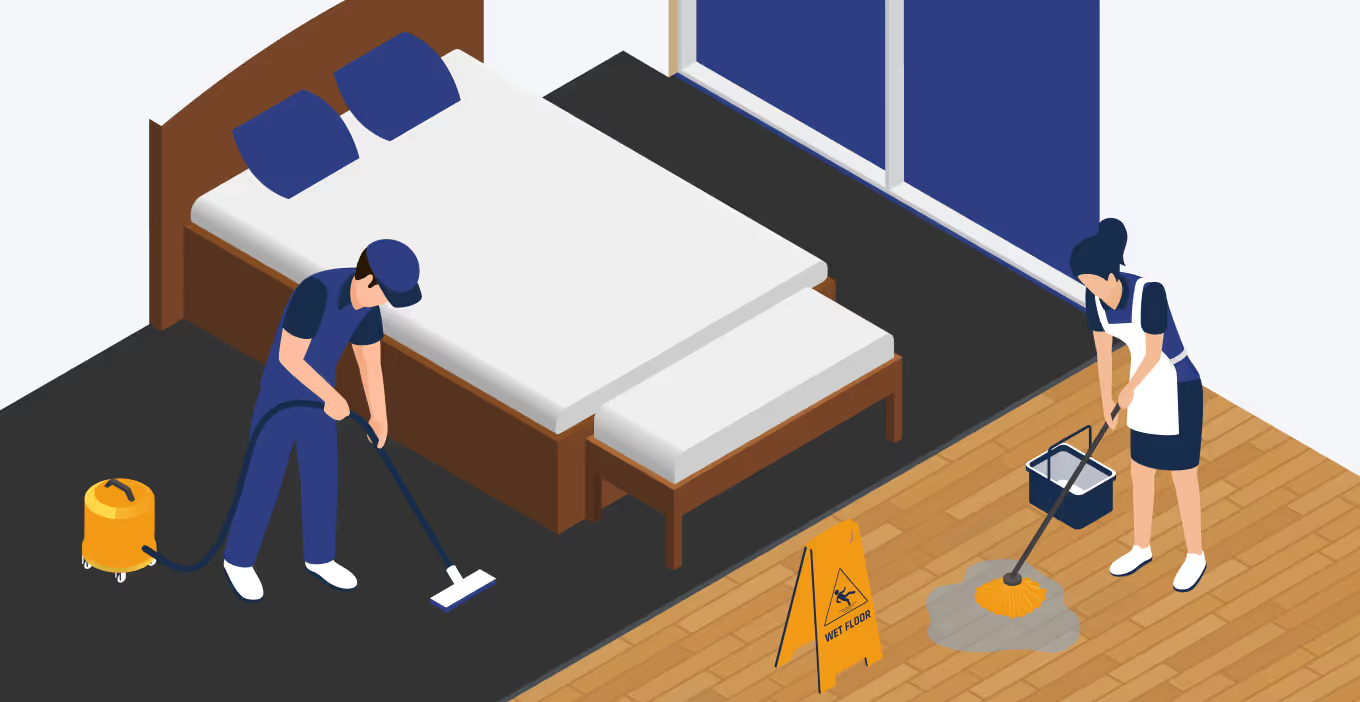It only takes a small detail to sway a potential tenant seeking a rental property.
The floors are a crucial detail, often overlooked even though floors can be a deal-breaker. Floors are a canvas that reveals the space's beauty and indicates what a finished look could be once all furniture and other aesthetics are added to the room.
In this article, we dive deep into the pros and cons of carpet vs. vinyl for your rental property.
A property owner who lives on their property has a solid idea of how they use their floors. Choosing a floor will be based on their needs, available materials, budget, and aesthetic preferences. There is a grey area with a rental property, as it is often impossible to determine how tenants will treat their floors. Property owners may not know how the tenants choose furniture, wears shoes, or handle bulky items. However, they must consider the fact that the floor can get damaged very quickly. Typically, the wear and tear on rental flooring can be high. For that reason, rental property owners need to select flooring that is both durable and attractive.
Two options are popular for rental properties, and those are carpet or vinyl.
- Carpet flooring is made using woven fiber and is available in a range of thickness and texture options. It is used as an upper layer of pile on a floor and is held in place with a backing.
- Vinyl plank flooring is a synthetic flooring material available in sheet or tile form. They can be used as interlocking sections or attached to a floor as an upper layer using a strong adhesive.
The Non-Negotiables When Choosing Flooring Options
Before a landlord decides what the best flooring option is, they need to develop some non-negotiables. Non-negotiables are criteria that form boundaries and guide what is acceptable for a property owner. It would help if you considered the following:
- The Tenant – Understanding the type of tenant is essential. Where is your tenant coming from? Are you targeting young students who are close to a university or college? Or perhaps families with young children? Or maybe your property is located close to the beach? With clarity on the type of tenant and their potential activities, the flooring decision becomes more straightforward. Sometimes, you can charge tenants for carpet cleaning if it's excessive wear and tear.
- Future Plans – Understand the long-term plan for the property. Flooring decisions extend beyond the apartments or units that are being occupied by tenants. They also include public areas such as lobbies, gyms, hallways, elevators, and other rooms. High traffic areas need flooring that is highly durable and can withstand heavy use without incurring damage. If the property is to be sold in the short term, you should consider a lower-cost investment in the flooring. For the long term, a low maintenance option would be a better bet.
- Functionality – This is where location and type of rental property come into consideration. In areas that are hot and humid, vinyl flooring may be more practical. In parts of the home that come into contact with water, such as the bathroom, vinyl flooring is an excellent option. Colder areas, or rooms, such as bedrooms, may fare better with carpet as a flooring option.
Whether the decision is to go with carpet or vinyl, the property owner should consider the resident requirements rather than their personal tastes. This is especially the case if these tastes lean towards the more eccentric side. Design options should be neutral, both in design and in color, to appeal to as many people as possible.
Vinyl Flooring
Luxury Vinyl plank flooring is an excellent flooring solution when durability is the primary feature a property manager seeks. In residential and commercial properties, luxury vinyl flooring can hold up with heavy usage over long periods. Here are some other reasons that vinyl flooring is an excellent option.

Pros of Vinyl Flooring
- Design versatility – There are hundreds of designs available to choose from, allowing for vinyl flooring to easily fit into any plan. The designs can also mimic other high-value flooring materials such as wood, marble, and even stone. This makes it possible to choose an attractive design for tenants while standing the test of time.
- Affordability – Vinyl is a cost-effective option that is ideal for property managers seeking flooring for numerous units. Vinyl flooring costs approximately $2 - $6 for each square foot. This is the cost for the best vinyl flooring, strong enough to be used for commercial purposes. Affordability extends to the cost of the material and installation, labor, and long-term maintenance.
- Maintenance – Vinyl flooring is easy to maintain, easy to clean, and affordable to install. For any property owner seeking to make a good return on investment with minimal but significant input, this flooring type will help the property owner save big.
- Pets – Where a tenant is likely to have a pet, then vinyl flooring is an excellent solution. Vinyl is a water-resistant material. It is easy to clean in case of any accidents and can withstand scratching without sustaining damage.
- Installation – Vinyl floors are easily installed as tiles. This means that it is possible to maintain with ease, manipulate designs, and upgrade as well. Where heavy furniture may affect a few sections of the floor, a replacement can bring the floor up to 'as new' quality within a brief period.
Cons of Vinyl Flooring
- Movability – This type of flooring cannot be moved from one unit to another, primarily if you used adhesive to put it in place during installation. When large sections of tiles are used, repairing the floor can be a challenge.
- Toxicity – Being a synthetic material means that there is an element of toxicity with Vinyl flooring. Vinyl is made using PVC, which, just after installation, can emit gasses that can be potentially harmful.
- Improper preparation – These floors are easy to install, but they need to be installed by someone who knows what they are doing. This is because the subfloor, the section beneath the tiles, needs to be adequately prepared to make it smooth. Any holes, bumps, or foreign materials within it will affect the final look's quality and lead to damage.
Carpet Flooring
Carpet is highly versatile, especially when it comes to colors and textures. Any property manager will appreciate the cozy, warm atmosphere that is created by some lavish carpeting. There are several benefits of choosing carpet flooring, and they are as follows.

Pros of Carpet Flooring
- Maintenance – Carpets are low maintenance as they do not require regular buffing, oiling, or waxing like other floors like hardwood. Also, it is possible to replace a section of the floor without removing the entire carpet. This allows for cost savings when there is any damage to the floor in a rental property.
- Options – Of all the flooring options available, carpet is one of the most popular and has the most options available. With more options comes more competition and a range of price options for you.
- Comfortability – They offer a feeling of warmth and are incredibly comfortable. This makes a house or apartment feel like a home. Furthermore, the material that the carpets are made from is safe, meaning that there is less risk of slipping and falling. This makes the carpet ideal for use with families.
Cons of Carpet Flooring
- Costs – On the surface, purchasing carpet seems like a cost-effective option, with a square foot price coming up to between $3 and $5 on average. However, there is another cost element to be considered with carpet, and that is the cost of installation. This can increase the price by up to $2 per square foot.
- Long-term use – Carpets need to be replaced more often than vinyl floors. They can stain, rip, fray, smell, and get damaged when they are not cared for properly. To ensure that the carpet's lifespan is extended, it is essential to have a proper maintenance schedule that includes regular vacuuming and even steam cleaning.
- Dust and Dirt – Carpets can trap dust and dirt, leading to a dirty look and posing a health hazard. For tenants who have allergies, this could result in them experiencing respiratory problems. In addition to dust, little critters like dust mites can also hide with ease within carpet flooring.
The Bottom line
Floors can directly tie into the property's value and the price that a landlord, leasing agent, community manager, or property manager can charge a potential tenant. If you can charge more and generate greater profits, it's a win-win for everyone.
Weigh out the time it takes to install as you don't want your units to remain empty for too long.
We also recommend letting your tenants know the best way to maintain their floors. If all else fails and you need to clean the carpets yourself, check out our article on 7 tools to deep clean your rental dirty carpets.
Hopefully, this guide can help you evaluate which option is best for your space.
































.svg)
.svg)

